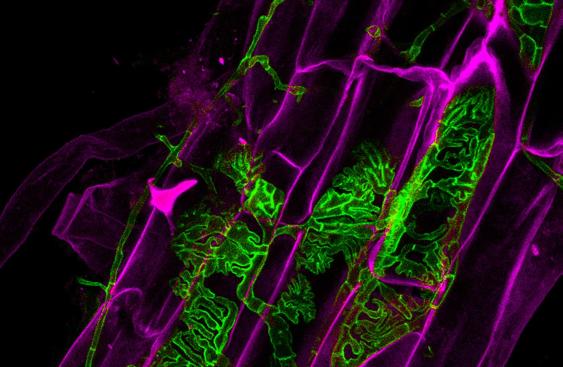Physiological and genomic remodelling of endophytic fungi in response to their environment
Physiological and genomic remodelling of endophytic fungi in response to their environment
Zhilin Yuan
Chinese Academy of Forestry
Root endophytic fungi (EF) play a crucial role in root guilds and have gathered increasing attention due to their diverse ecological functions and flexible lifestyles. The establishment of mutualistic symbioses with fungal endophytes across various lineages often enhances plant fitness, including growth and adaptation. The ‘symbiosis triangle’ hypothesis emphasizes the significance of environmental factors in regulating the outcomes of these symbiotic interactions. In this seminar, I will present prime examples that illustrate how soil nutrients and salt stress influence the behavior of endophytes at both the physiological and genomic scales.
Studies have demonstrated that variations in external nutrient levels or forms can lead to extensive physiological remodeling in fungi. These adaptations encompass changes in nutrient transporters, lipid metabolism, secondary metabolite biosynthesis, and plant-cell-wall-degradation enzymes. These changes contribute, at least in part, to the maintenance and erosion of symbiotic relationships. Furthermore, recent findings indicate that certain populations of EF undergo population divergence arising from positive selection of genomic islands and chromosome polymorphisms, including ploidy changes, in response to natural soil saline conditions. We propose that hybridization accompanied by doubling ploidy allows EF to generate phenotypic novelty and drive genome evolution for saline adaptation. Notably, allodiploid EF strains exhibit increased vigor under a range of abiotic stresses, which suggests the potential of using allodiploid EF isolates to improve plant salt tolerance.
By gaining a better understanding on how environment conditions impact EF physiology and genome evolution, we can establish a new framework to enhance the symbiotic efficiency of EF, and ultimately benefiting host plants and their fitness.
Biography
Dr. Zhilin Yuan is a distinguished professor at Chinese Academy of Forestry. In 2002 and 2005, he obtained his bachelor’s and master’s degrees from Nanjing Normal University. In 2010, he got the Ph. D degree of plant pathology from Zhejiang University. Since 2005, he has been affiliated with Research Institute of Subtropical Forestry, Chinese Academy of Forestry. In addition, he served as a guest staff member in the Department of Life Sciences (Division II: Forestry and Ecology) of National Science Foundation of China (NSFC) from January to October 2018. Dr. Yuan visited Duke University, Technische Universität Wien, Auburn University, and Institute of Microbiology, Czech National Academy of Sciences for academic exchanges between 2012-2016.
Presently, Dr. Yuan holds the position of Principal Investigator at the State Key Laboratory of Tree Genetics and Breeding and he is also a member of the Professional Committee on Forest Soils of Soil Science Society of China. His main research interests focus on tree–fungus symbioses and genetic and environmental control of their interactions. Dr. Yuan has an impressive publication record, with over 20 articles published in prestigious journals including the ISME Journal, Biotechnol Adv, Curr Biol, Plant Cell Environ, and Appl Environ Microbiol.
In recognition of his contributions, he has received numerous awards and honors. He was honored as the Excellent Youth of Chinese Academy of Forestry in 2014, the 2nd level training personnel of the ‘151’ Talent Project of Zhejiang Province in 2015, the 14th Youth Award of Science and Technology of Chinese Forestry in 2017, and he is also the recipient of the ‘Hundred Million’ Talent Project of the State Forestry and Grassland Administration. He hosted the Youth Fund, General Fund and Outstanding Youth Fund of NSFC.


